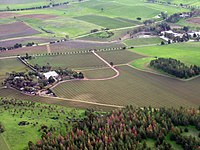
Photo from wikipedia
Abstract Driving cessation, often due to health-related changes, can be a particularly challenging and troublesome transition in older adulthood that can lead to social isolation. While policy makers have long… Click to show full abstract
Abstract Driving cessation, often due to health-related changes, can be a particularly challenging and troublesome transition in older adulthood that can lead to social isolation. While policy makers have long recognized the potential impact of an aging population on Canada's health care and national pension plans, the transportation needs of older adults have received relatively less attention. For older adults residing in small towns and rural areas who rely, more often than not, on the personal automobile there is usually limited or no access to public transportation. For policy makers to respond effectively to the transportation needs of an aging population, particularly those living in rural areas, the first step is to understand the travel behaviours of older adults living in such areas, particularly as they approach the transition when they will cease to drive. This paper reports on qualitative research exploring the driving-related challenges and needs faced by older adults in small towns and rural areas near Hamilton, Ontario, Canada. Results revealed four major themes: lack of transportation options in rural areas, changes in driving behaviours, the lack of planning for driving cessation, and the social isolation that comes from the loss (or potential loss) of one's driver's license.
Journal Title: Journal of Transport Geography
Year Published: 2020
Link to full text (if available)
Share on Social Media: Sign Up to like & get
recommendations!